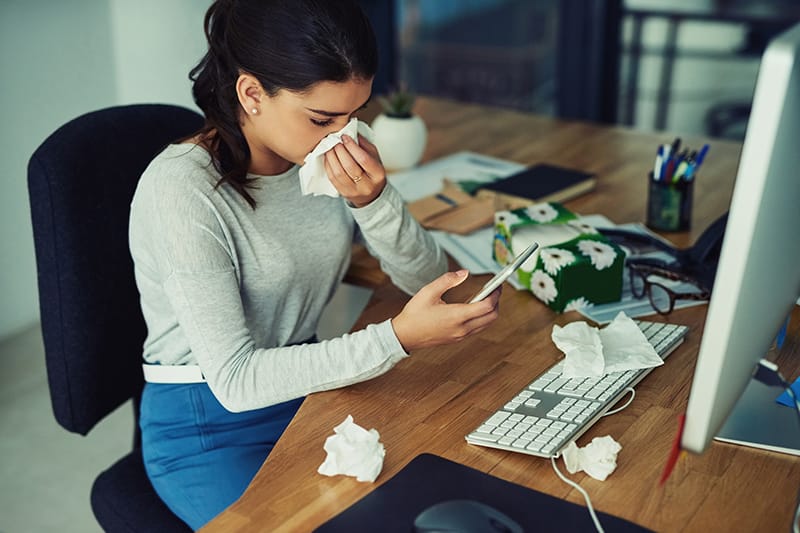Coughing. Sneezing. Stuffy, runny nose. Fatigue and weakness. When these symptoms hit, you’re miserable and in search of relief.
You might assume it’s just a cold and reach for the cold meds. You might be wrong.
Yeah, these are the main symptoms of the common cold. But they’re also symptoms of seasonal allergies. Outside of cold and flu season, it’s hard to know the difference.
So how can I tell the difference between a cold and allergies?
Cold and allergy symptoms mirror each other, but they result from very different immune responses. The common cold is a virus. Seasonal allergies are your body’s response to exposure to allergens like pollen, grass, mold, dust and ragweed. While symptoms overlap, there are some that are distinct to each condition.
Common Cold and Seasonal Allergy Symptoms
| Cold | Allergies | |
|---|---|---|
| Common | Cough | Sometimes |
| Common | Runny or Stuffy Nose | Common |
| Common | Sinus Congestion | Common |
| Common | Sneezing | Common |
| Sometimes | Fatigue and Weakness | Sometimes |
| Common | Sore Throat | Sometimes |
| Rare | Itchy, Watery Eyes | Common |
| Sometimes | Aches and Pains | Never |
| Sometimes | Ear Fullness or Pain | Sometimes |
| Rare | Fever | Never |
| Thick and yellow or green | Mucus | Thin, watery and clear |
“It can be difficult to tell the difference — even for providers — because a lot of the typical symptoms overlap between the two,” says April Kolb, DO, family physician at The Iowa Clinic’s Waukee location on Alice’s Road.
More than half of cold and allergy symptoms are shared, but a few can clue you into which one is afflicting you. If you have general body aches and pains, cough up mucus or are running a fever along with your other issues, a cold is the culprit. If your eyes are watering and your nose is too, your allergies are acting up.
Sorting through the symptoms is not always simple. When your mix of symptoms is too confusing to figure out, look instead at when they hit and how long they last. Symptoms that come on suddenly and generally happen at certain times of the year are most likely due to seasonal allergies. And they may last for several weeks until the pollen count or your exposure to allergens drops. A cold can last just as long, but most pass after three to 10 days. Cold symptoms also tend to come on gradually, developing one at a time over the course of a few days.
“Typically allergies last longer than cold symptoms do. Symptoms lingering for one to two weeks or more are consistent with allergies,” Dr. Kolb says.
I feel terrible! What treatments stop a cold or seasonal allergies?
You’ve probably heard the phrase, “There’s no cure for the common cold.” The same can be said for seasonal allergies. Like the cold virus, you have to wait it out and let the condition run its course. Depending on the length and severity of that particular allergy season, that can be a long, agonizing wait.
While you can’t stop a cold or allergies once they start, you don’t have to suffer for weeks until things pass. You can manage your cold and allergy symptoms with some tried-and-true remedies or over-the-counter medications.
Common Cold Treatments
Colds can be over before you know it. By the time symptoms drag you down, the virus could be on its way out. For colds that linger, the most common treatments are:
- Rest – Take it easy to help with the fatigue and weakness, and let your immune system do its job. Rest is always a good idea when you’re fighting a bug, so enjoy the extra z’s.
- Pain relievers and fever reducers – Acetaminophen is best for relieving cold symptoms. Take some Tylenol for any aches and pains. Ibuprofen and naproxen work better if you have a fever and also help relieve sore throat and body aches.
- Decongestants and nasal sprays – Over-the-counter cold medications help your runny, stuffy nose by drying out and clearing up your nasal passages and postnasal drip. They may come as a pill, spray or rinse.
- Cough suppressants – A cough is productive. It’s your body’s way of clearing mucus and germs from your throat and lungs. But if your cough is interfering with your sleep or severely affecting your day, cough syrup can provide temporary relief.
- Water – Yep, good ol’ H2O! Water also helps with congestion and allows your mucus to flow freely. Drink plenty of water and avoid alcohol and caffeine to stay hydrated until your cold is gone. And if a sore throat accompanies your cold, gargle warm salt water to soothe it.
Seasonal Allergy Treatments
Since symptoms overlap, treatments do, too. Rest, water and decongestants all help manage allergy symptoms. There are several other remedies specific to seasonal allergies that can help you function. The best way to relieve allergy symptoms is to use a combination of these treatments:
- Avoidance – It isn’t easy, but avoiding your allergy triggers is the best way to avoid their effects. If you aren’t exposed in the first place, you won’t experience the symptoms. For example stay indoors and close windows if pollen counts and outdoor irritants are high.
- Antihistamines – This drug comes in pill or nasal spray form. It blocks the chemical released by your immune system, reducing sneezing, congestion, runny nose and itchy, watery eyes. Some medications combine antihistamines and decongestants to get rid of even more symptoms.
- Saline rinses and sprays – Like with a sore throat, salt water can provide relief in your nasal passages. Use a squeeze bottle or neti pot with your own solution or buy an over-the-counter spray bottle to dry and clear out your nose. Nasal steroid sprays like Flonase or Nasacort can provide quick and long-lasting allergy relief.
Nothing’s working. Is there anything else that can relieve my symptoms?
Yes, there’s more. Any time your symptoms last longer than expected or are still unbearable after trying at-home treatments, you should visit your primary care provider.
“There are subtle differences between the two in physical exam findings. Your provider will conduct a physical exam and ask about the type, duration and severity of your symptoms to determine if allergies or a viral illness is more likely,” Dr. Kolb says.
With a cold, you can manage the symptoms until it runs its course. Get checked out if your cough, sore throat, congestion or headaches don’t go away after 10 to 14 days, or if you develop worsening symptoms like chest pain, severe sore throat, ear pain, or shortness of breath. A lingering or worsening cold can lead to other issues, like a sinus infection, or be something else entirely.
Allergies have many more treatments than what you can get at your local pharmacy. Prescription pills, nasal sprays and allergy shots can provide relief when over-the-counter medications can’t. Some provide more immediate symptom relief; others should be taken for the long haul to keep ahead of the shifting seasons.
If your allergy symptoms haven’t improved in two or three weeks, discuss your symptoms with your doctor. They can identify prescription-strength allergy medications that can help or refer you to an allergist to find the best solution for you.


